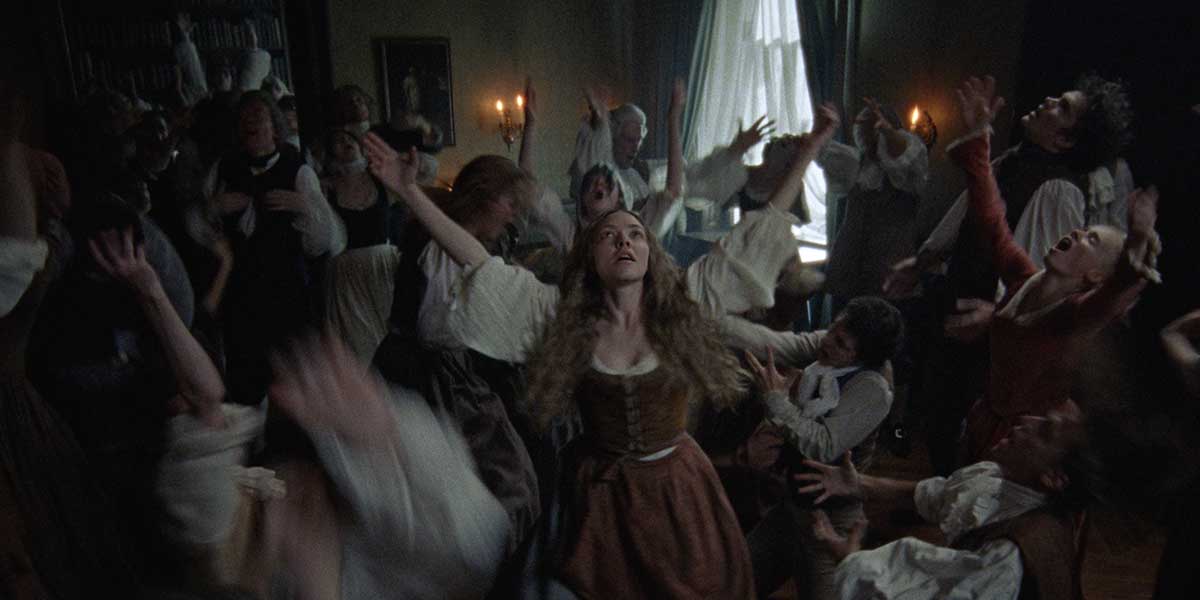By the age of 30, Canadian filmmaker Daniel Roher had won the Oscar for Best Documentary Feature for “Navalny.” His next documentary, “Blink,” premiered at Telluride last year. Wasting little time, he returns to the Colorado Rockies one year later with “Tuner,” but “this one feels a little different,” he told a sold-out crowd Saturday, before its world premiere at the fest’s Galaxy theater. He’s referring to his pivot into narrative feature filmmaking, joining a host of his documentarian contemporaries making this same move of late — including Joshua Oppenheimer whose musical “The End” also played Telluride last year.
“Tuner” continues Leo Woodall’s own move into leading man territory, after “Bridget Jones: Mad About the Boy” earlier this year. The Brit broke out as the conflicted rent boy in Season 2 of “The White Lotus,” and has also starred in recent TV series “One Day” and “Prime Target.” Here he plays Niki, a piano virtuoso whose promising career was cut short by a rare hearing condition which makes him “allergic to sound,” he explains in a scene. Also starring Dustin Hoffman, the veteran leans on his natural charm in limited screen time as Harry Horowitz, who runs a small piano tuning operation with Niki as his sole employee. A humorous opening montage catalogues the odd couple’s drive across New York City’s five boroughs, tuning pianos for a host of wealthy clients. Harry fills the drive with rants about mercury levels in tuna, or how it’s not cholesterol you should be worrying about, it’s inflammation. (On that latter point, my health nut friends in L.A. would say, he’s not wrong.)
But this is not some kitchen sink, slice-of-life drama following two piano tuners, and the film’s safe-cracking subplot is set up conveniently — perhaps a smidge too much so — with little wasted time. Early on, Niki returns home from dinner at Harry’s and teaches himself, via online tutorials, how to crack Harry’s small home safe as a favor, after Harry accidentally locks his meds inside. Niki quickly realizes his hearing condition has a single silver lining: It lends him a special knack for this practice. He makes nothing of it, because when would he possibly be called upon to use it again?
But, as luck would have it, a few short scenes later, during a late night tuning session in a seemingly-empty mansion (Billy Joel is scheduled to play this particular piano at a benefit), Niki miraculously finds himself performing the same safe-cracking favor for some shady Israelis. Led by Uri (Lior Raz), the trio quickly ropes him into their small-time criminal enterprise, which involves swiping cash and luxury items (watches, jewelry, etc.) from Uri’s wealthy clients. They reason that if they keep the take small, their clients won’t miss the objects. And if they do? The clients fire their housekeeper and file an insurance claim. While not a foolproof plan, there have been less thought out criminal rackets.
Hesitant to join them, Niki relents after learning that Harry, currently hospitalized after a heart attack, has $36,000 in past due Medicaid bills. Out on his first assignment, Niki freezes up, standing wordlessly in front of the safe, needing to be further convinced to pull the trigger and get to work. While committing a criminal act should give anyone not already in that line of work pause, he’s already agreed, accepted a cash advance and gone out with Uri and gang to the site. Why is this hesitation manifesting now and not earlier? A lack of prior characterization and depth in Woodall’s performance leads to a moment that feels included solely because this type of movie often includes that initial indecision.
Niki’s condition forces him to wear corded ear plugs, along with a pair of noise-cancelling headphones he slips on when things are especially noisy (which in NYC is often). This sends a clear signal to those around him that don’t know the objects’ purpose, to leave him alone. And so Niki has learned to navigate a life of isolation, outside of Harry and his wife Marla (Tovah Feldshuh). Woodall’s quiet brooding and puffy blue eyes recall Jeremy Allen White, while his restless energy and physical appearance calls to mind a young Michael Pitt. This combination for a leading man is unique, but it’s hard not to sense that Woodall is miscast as this former-pianist turned-tuner, turned-safe cracker, both physically and with a lack of interiority he renders onscreen in his silent stoicism.
His large arms covered in an array of amateur stick and poke tattoos confound: Is there an unreferenced stint at RISD or CalArts in Niki’s past? While the wealthy homeowners often mistake Niki and Harry’s piano tuning practice as blue collar in nature, frequently asking the pair to perform tasks like fixing the toilet or the WiFi, piano tuning is positioned in the upper echelons of bourgeois culture, as a refined, likely even nerdy profession. What other profession would have clientele with $5,000 laying around — which the film makes clear is a cheap rate — to pay the pair to tune their Steinway which they will in turn likely never play?
There is an artfulness to piano tuning that Woodall explains poetically to music student Ruthie (Havana Rose Liu), which kicks off a courtship between the two, hampered initially by Ruthie’s own stubbornness and rightful suspicion of Niki’s aloof schtick. “Tuner” comes fully alive when Liu enters the picture as Ruthie, and she is a revelation in her complex portrayal of this grumpy-yet-sweet, driven musician hellbent on securing a fellowship with a renowned composer known as Meissner (Jean Reno). Leaning into romantic comedy tropes, a chance run-in leads Harry to insist Niki walk her to class — a walk between two hardheads that goes about as well as you might expect.
Roher and co-writer Robert Ramsey’s script slyly brings them together once more, this time for good, when Ruthie’s grandmother’s piano is damaged from a ceiling leak. Out of options, she needs someone fast to come help mitigate the damage. Liu’s portrayal of Ruthie is empowered yet never caricaturish; she enjoys the comforts of her newfound relationship with Niki, even if she is openly perplexed by him at times, like when he gifts her a vintage Rolex after only a month of dating. Closeups of her face in various states of puzzlement, affection, or frustration dazzle, and remove any doubt: Liu is a star.
In this middle section, “Tuner” slides into a familiar narrative register: As Niki gets in deeper with this dangerous gang of thieves, he struggles to balance those commitments with the demands of his relationship with Ruthie. It becomes less about whether Niki can keep his dual lives separate, and more about how things will resolve between the couple once it inevitably does all come crashing down.
With his extreme sensitivity to all sound, Niki’s kryptonite is a blue airhorn that Uri uses to control him once Niki begins to actively look for a way out. A tool from an iconic “Jackass” prank being deployed to incapacitate the hero, leaving him screaming in agony on the ground, “Tuner” is undeniably very silly, hewing more closely to a Jacques Audiard picture than a hard-boiled crime thriller. Like Audiard, it seems to relish combining its quirky elements into something emotional and resonant. In fact, “Tuner” shares much in common with Audiard’s “The Beat That My Heart Skipped” with both exploring the intersection of concert piano playing and small-time crime.
The intentional throwback nature of “Tuner” carries benefits and drawbacks. There’s a comfort in simply sitting back and allowing its competent filmmaking take you through its well-worn narrative beats. At other times, the script can feel unimaginative and overly paint-by-numbers, as if conceived by Roher and Ramsey with Robert McKee’s “Story” in one hand, a highlighter in the other. Some genre subversion would be welcome, to freshen things up a bit. To a viewer with even a rudimentary understanding of this type of story, many of its twists are choreographed well in advance. But not always. A key third act twist is so coincidental it’s almost impossible to see coming. This twist doesn’t derail the narrative with its sheer implausibility, so much as clarify the type of movie you’ve been in the entire time.
From the start, “Tuner” has largely been a fantasy. Where else do piano tuners occupy such status that their work days are filled with near constant house calls? And where else can Niki pay off Harry’s medical debt in stacks of cash — $10K at a time — without arousing any suspicion? “Tuner” correctly recognizes that if an audience is invested in the love story at the center, they will be forgiving of any overly-convenient plotting. And while the love story at the center of “Tuner” can be captivating, especially during a montage cataloguing Niki and Ruthie’s whirlwind first month, Liu is ultimately forced to carry too much of the burden in this department, which then draws these eyebrow-raising contrivances out into the light more openly.
Visually, close-ups from inside the lock mechanisms of the safes make it easy to track Niki’s progress as he carefully spins the mechanism, listening intently for that subtle metal clink in a just slightly higher register whenever the correct number aligns. It’s a satisfying process to watch unfold and is rendered well on screen, both visually and aurally with sound designer Johnnie Burn’s (“The Zone of Interest”) expert craft. Otherwise, “Tuner” throws a lot at the wall stylistically. As Roher’s first narrative project, one senses a willingness to play around and try lots of things out. “What if we placed a camera on the safe handles as Niki spins it?” “What about a fisheye reflection of his face in the safe’s chrome plating?”
It’s a playful movie in form and content, one that rarely takes itself too seriously, and as such, it can’t help but skate by as a pleasurable ride, whether through allowing Hoffman, Woodall and Liu space to trade quips, or through snappy editing when entering a new location. Despite its light tone, Roher is not afraid to get darker and directly address the difficult situations his cast of characters find themselves in, and the film walks that tonal tightrope between light humor and the high-stakes world of both safe-cracking and new relationships well. But, as if to remind the audience where its true sensibilities lie, it’s telling that the film undercuts an emotional closeup of Liu in the film’s closing moments with an off-handed, off-screen, one-liner from Niki. Betting correctly on how this risk would play out, Niki’s line drew a hearty laugh from the Telluride audience, ending the film on a high note.
Grade: B-
“Tuner” premiered at the 2025 Telluride Film Festival. It is currently seeking U.S. distribution.
Want to stay up to date on IndieWire’s film reviews and critical thoughts? Subscribe here to our newly launched newsletter, In Review by David Ehrlich, in which our Chief Film Critic and Head Reviews Editor rounds up the best new reviews and streaming picks along with some exclusive musings — all only available to subscribers.



